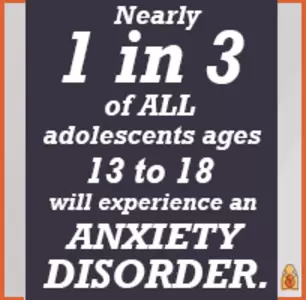Quite often anxiety is hidden and parents can be unaware their teen is suffering from anxiety. They just think they have a ghastly teenager on their hands. Teenagers with their jumbled up emotions don’t recognise they are suffering from anxiety, and if they do they do not associate their behaviours with it. When your teen has difficulty managing their emotional responses they’re going to seem aggressive and conflict-driven. And as parents we have to deal with all this aggression and conflict, when quite simply if you got them to a doctor to get an anti depressant to regulate their moods you would have a much different teenager.
I thought I would point out some of the behaviours other than aggression and conflict that can be exhibited , so that parents can have a greater awareness of what their teenagers might actually be going through:
- Recurring fears and worries about routine parts of everyday life
- Irritability
- Trouble concentrating
- Extreme self-consciousness or sensitivity to criticism
- Withdrawal from social activity
- Avoidance of difficult or new situations
- Chronic complaints about stomachaches or headaches
- Drop in grades or school refusal
- Repeated reassurance-seeking
- Sleep problems
- Substance use
Not all anger is linked to anxiety, but often if individuals take a step back and uncover what is triggering their anger, they may discover that they are showing signs of fear and panic, which may be the root of an anxiety disorder.

Given that teens experience a wide variety of physical and emotional changes as they grow, an anxiety disorder can be difficult to spot. Many red flags may seem like usual teens struggles or be chalked up to hormones. Watch for these hidden signs of anxiety in your teens:
EMOTIONAL CHANGES:
-
Feeling “keyed up”
Feeling on edge
Irritability
Difficulty concentrating
Restlessness
Unexplained outbursts
Feeling “keyed up”
Feeling on edge
Irritability
Difficulty concentrating
Restlessness
Unexplained outbursts
SOCIAL CHANGES:
-
Avoiding social interactions with usual friends
Avoiding extracurricular activities
Isolating from peer group
Spending increased time alone
Avoiding social interactions with usual friends
Avoiding extracurricular activities
Isolating from peer group
Spending increased time alone
PHYSICAL CHANGES:
-
Frequent headaches, including migraines
Gastrointestinal problems
Unexplained aches and pains
Excessive fatigue
Complaints of not feeling well with no obvious medical cause
Changes in eating habits.
Frequent headaches, including migraines
Gastrointestinal problems
Unexplained aches and pains
Excessive fatigue
Complaints of not feeling well with no obvious medical cause
Changes in eating habits.
SLEEP DISTURBANCES
It can be difficult to know whether fatigue is a product of anxiety or of a busy schedule. Watch for these red flags:
-
Difficulty falling asleep
Difficulty staying asleep
Frequent nightmares
Not feeling refreshed after sleep
Difficulty falling asleep
Difficulty staying asleep
Frequent nightmares
Not feeling refreshed after sleep
POOR SCHOOL PERFORMANCE
-
Significant jump in grades (usually downward)
Frequently missed assignments
Describes feeling overwhelmed by workload
Procrastinates on, or has difficulty concentrating on, homework assignments more than usual
Significant jump in grades (usually downward)
Frequently missed assignments
Describes feeling overwhelmed by workload
Procrastinates on, or has difficulty concentrating on, homework assignments more than usual
PANIC ATTACK SYMPTOMS
-
Rapid heartbeat
Sweating and trembling
Dizziness
Upset stomach
Difficulty breathing
Chest pain
Feeling like they’re dying
Feeling like they’re “going crazy”
Numbness or tingling in arms and legs
Derealization.
Rapid heartbeat
Sweating and trembling
Dizziness
Upset stomach
Difficulty breathing
Chest pain
Feeling like they’re dying
Feeling like they’re “going crazy”
Numbness or tingling in arms and legs
Derealization.